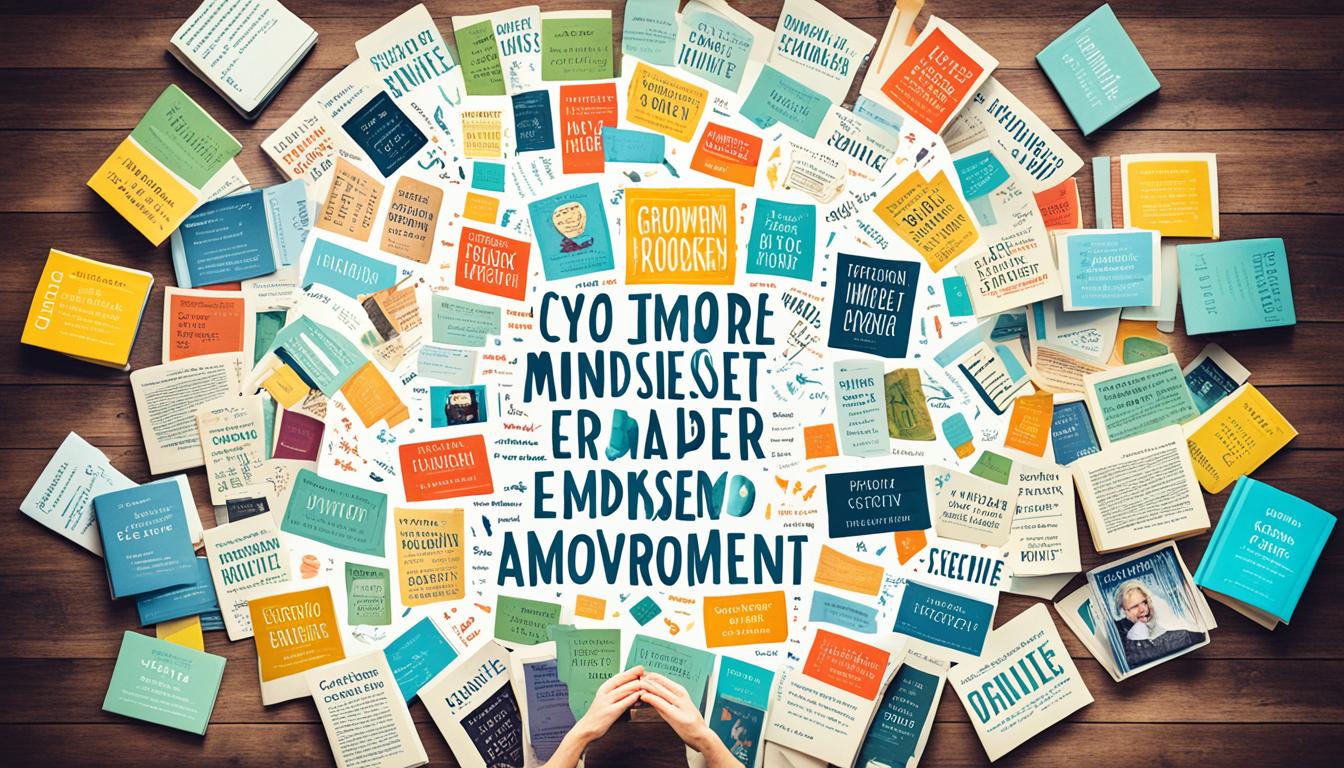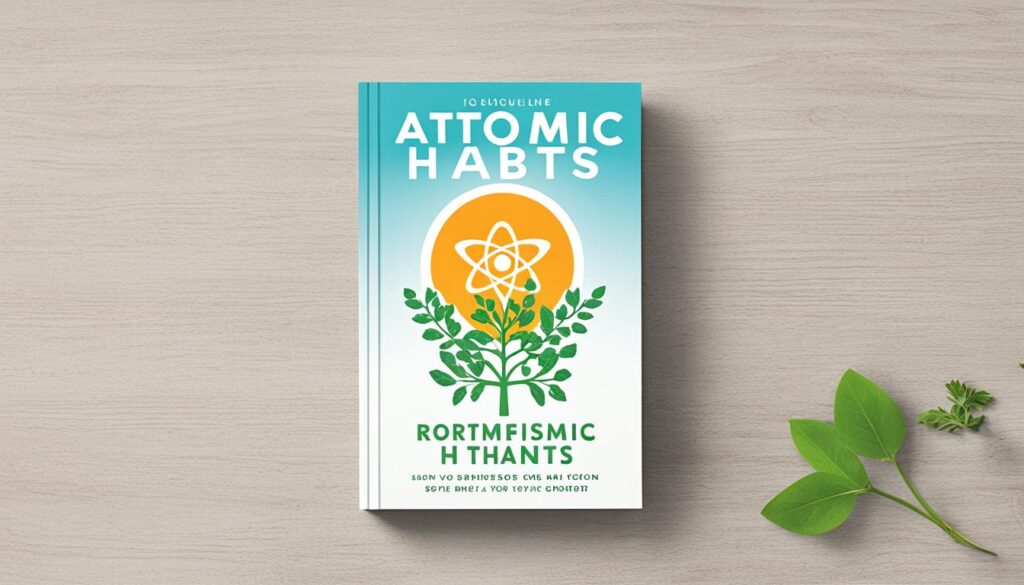Self-Improvement and Motivation
Growth Mindset Book Recommendations for Self-Improvement
Unlock personal development with top book recommendations for a growth mindset, curated to inspire and facilitate your self-improvement journey.

Are you ready to transform your mindset and unlock your full potential? Whether you’re aspiring to achieve personal or professional success, cultivating a growth mindset is key. But where do you start? We’ve curated a list of the best books on growth mindset that will empower you to embrace challenges, persevere through obstacles, and foster a passion for continuous learning and self-improvement.
Key Takeaways:
- Discover transformative books that inspire and equip you with invaluable tools for personal growth.
- Explore the concept of fixed and growth mindsets and their impact on achievement and development.
- Learn about the intricacies of human thought and decision-making processes.
- Internalize the seven habits of highly effective people and create lasting positive changes.
- Confront self-sabotage, shift perspectives, and embrace personal transformation.
Mindset: The New Psychology of Success
“Mindset: The New Psychology of Success” by Carol S. Dweck is a groundbreaking book that explores the power of mindset in shaping personal achievements and growth. Dweck introduces the concept of fixed and growth mindsets, illustrating how an individual’s belief about their abilities can profoundly impact their potential and trajectory in life.
The book presents research-backed insights and practical examples to help readers understand the differences between fixed and growth mindsets. A fixed mindset is characterized by a belief that abilities and intelligence are fixed traits that cannot be changed or developed. On the other hand, a growth mindset is an outlook that embraces challenges, values effort, and believes in the potential for continuous learning and improvement.
By providing numerous real-life case studies and examples, Dweck illustrates how individuals with a growth mindset are more resilient, adaptable, and successful in various aspects of life. She emphasizes that adopting a growth mindset is not only beneficial for personal development but also essential for nurturing talent and fostering a positive learning environment.
“Becoming is better than being.” – Carol S. Dweck
The book offers actionable strategies and techniques to cultivate a growth mindset and overcome fixed limiting beliefs. Dweck suggests that embracing challenges, seeking feedback, and persisting through setbacks are crucial elements in developing a growth mindset. By reframing failure as an opportunity for growth and focusing on the process rather than the outcome, individuals can unlock their full potential and achieve greater success.
The Power of Mindset Transformation
Dweck’s insights have profound implications for individuals, educators, parents, and leaders. By understanding the impact of mindset on motivation, resilience, and personal growth, readers can apply the principles and strategies outlined in the book to their own lives.
The book encourages readers to reflect on their own mindset and offers practical guidance for fostering a growth mindset in various contexts. Whether it’s in the classroom, workplace, or personal relationships, cultivating a growth mindset can lead to improved performance, increased happiness, and more fulfilling relationships.
Mindset: The New Psychology of Success provides a valuable roadmap to unlocking one’s full potential, embracing challenges, and fostering personal growth.
Thinking, Fast and Slow
“Thinking, Fast and Slow” by Daniel Kahneman is a groundbreaking exploration of the two systems that drive human thought: System 1 and System 2. System 1 operates quickly and intuitively, relying on heuristics and biases, while System 2 is deliberate, analytical, and requires effort. Together, these systems shape our decision-making processes and influence how we perceive and interpret the world around us.
In his book, Kahneman draws on decades of research in psychology and behavioral economics to uncover the cognitive biases that System 1 often generates. He reveals how these biases can lead to erroneous judgments, affecting our understanding of risk, confidence, and probability.
With a focus on decision-making, “Thinking, Fast and Slow” offers valuable insights into the complexities of human thought. It highlights the interplay between intuitive and rational thinking and provides strategies to enhance our ability to make more informed and rational decisions.
“The major function of System 1 is to maintain and update a model of your personal world, and to generate the best possible predictions under the circumstances.”
Kahneman’s work has revolutionized the field of psychology, challenging traditional assumptions about human rationality. His research has far-reaching implications for various domains, including economics, politics, and public policy. By shedding light on the flaws and limitations of human decision-making, “Thinking, Fast and Slow” equips readers with a deeper understanding of their own cognitive processes and the biases that may influence their judgments.
System 1 and System 2: Understanding the Two Thinking Systems
To further grasp the concepts presented in “Thinking, Fast and Slow,” it is essential to explore System 1 and System 2 in more detail.
| System | Description |
|---|---|
| System 1 | Fast, intuitive, automatic thinking |
| System 2 | Slow, deliberate, effortful thinking |
System 1 operates effortlessly and involuntarily, often relying on heuristics, which are mental shortcuts that help us make quick decisions. However, these shortcuts can lead to cognitive biases and errors when applied to complex problems or ambiguous situations.
On the other hand, System 2 requires conscious effort and is responsible for more deliberate, analytical thinking. This system is used when we engage in tasks that demand our full attention and concentration, such as solving complex mathematical problems or evaluating evidence in an argument.
By understanding the interplay between these two systems, readers of “Thinking, Fast and Slow” gain valuable insights into their own thinking patterns and can take steps to enhance their decision-making abilities.

The 7 Habits of Highly Effective People: Guided Journal
“The 7 Habits of Highly Effective People: Guided Journal” by Stephen R. Covey offers a structured approach to internalizing the seven habits, helping individuals cultivate personal and professional effectiveness. By reflecting on their goals, values, and behaviors, readers are encouraged to make positive changes and create lasting habits that lead to increased productivity and fulfillment.
This guided journal is a companion to Stephen R. Covey’s immensely popular book, “The 7 Habits of Highly Effective People.” It provides a practical and interactive way for individuals to apply Covey’s transformative principles in their daily lives.

Journaling for Personal Effectiveness
The journal prompts are designed to facilitate self-reflection and active engagement with each habit. By documenting thoughts, insights, and reflections, individuals can deepen their understanding of the habits and integrate them into their routines. The prompts encourage readers to identify areas for improvement, set specific goals, and track progress over time.
“The 7 Habits of Highly Effective People: Guided Journal” allows you to delve deeper into Covey’s timeless wisdom and apply it directly to your life. Through thoughtful journaling, you can gain clarity, develop self-awareness, and make meaningful changes that align with the seven habits.”
Tracking Progress and Celebrating Success
In addition to the journaling prompts, the guided journal provides spaces for tracking daily habits and recording achievements. This visual representation of progress can be highly motivating and serves as a reminder of the commitment to personal growth and effectiveness.
By using “The 7 Habits of Highly Effective People: Guided Journal,” readers can establish a regular journaling practice that reinforces the seven habits, enhances self-accountability, and helps them stay focused on their personal and professional goals.
| Key Features | Benefits |
|---|---|
| An interactive and engaging format | Encourages active participation and deeper reflection |
| Prompts inspired by each of the seven habits | Facilitates habit integration and application in daily life |
| Trackers for habit consistency and achievement recording | Visualize progress and celebrate successes along the journey |
| Ample writing space for personal reflections | Allows for deeper self-exploration and discovery |
Whether you are new to Covey’s principles or a long-time practitioner, “The 7 Habits of Highly Effective People: Guided Journal” offers a valuable tool to deepen your understanding, hold yourself accountable, and make positive changes that align with the habits of highly effective people.
The Mountain Is You: Transforming Self-Sabotage Into Self-Mastery
“The Mountain Is You: Transforming Self-Sabotage Into Self-Mastery” by Brianna Wiest invites readers to confront their internal obstacles and transform them into opportunities for self-discovery and growth. The book offers a roadmap to shifting perspectives, building self-awareness, and embracing the journey of personal transformation.
Wiest’s insightful guide emphasizes the power of self-reflection and the importance of taking responsibility for one’s own actions and choices. Through engaging anecdotes and practical advice, she explores the concept of self-sabotage and provides actionable strategies to overcome it.
This transformative book encourages readers to cultivate self-mastery by identifying self-sabotaging patterns and shifting towards self-empowerment. Wiest delves into the depths of self-doubt, fear, and limiting beliefs, guiding readers on a path towards self-acceptance, resilience, and personal growth.
“If you can change your mind, you can change your life,” writes Wiest in “The Mountain Is You.” Through introspection and mindset shifts, readers can transcend their limitations and tap into their full potential. The book serves as a compass, guiding individuals towards self-discovery, self-worth, and the inner strength needed to conquer life’s challenges.
Key Topics Explored in “The Mountain Is You”
- The impact of self-sabotage on personal growth
- Recognizing self-destructive behaviors and thought patterns
- Shifting perspectives and embracing self-awareness
- Building resilience and overcoming obstacles
- Cultivating self-compassion and self-acceptance
“The Mountain Is You” is a powerful tool for anyone seeking to break free from self-imposed limitations and unlock their true potential. With its practical exercises, thought-provoking insights, and compassionate guidance, this book will empower readers to embark on a transformative journey of self-mastery and personal fulfillment.

Awaken the Giant Within: How to Take Immediate Control of Your Mental, Emotional, Physical and Financial Destiny!
“Awaken the Giant Within” by Tony Robbins is a dynamic and empowering guide to personal change and transformation. With his wealth of knowledge and experience, Robbins provides readers with actionable strategies and principles to take control of their lives and achieve profound change in various areas.
Robbins emphasizes the importance of harnessing the power of emotions, beliefs, and behaviors to create lasting transformations. By understanding the influence of these aspects on our lives, readers can unlock their full potential and shape their destinies.
The book covers a wide range of topics, including mental, emotional, physical, and financial empowerment. With its holistic approach, “Awaken the Giant Within” offers readers a comprehensive toolkit to navigate the challenges they may encounter on their personal development journey.
Through thought-provoking exercises and practical guidance, Robbins encourages readers to challenge their limiting beliefs, set inspiring goals, and develop positive habits that pave the way for success. By implementing the strategies outlined in the book, readers can cultivate a more fulfilling and purpose-driven life.
“The secret of success is learning how to use pain and pleasure instead of having pain and pleasure use you. If you do that, you’re in control of your life. If you don’t, life controls you.” – Tony Robbins
Whether you’re seeking personal growth, striving for financial independence, or aiming to enhance your relationships, “Awaken the Giant Within” provides valuable insights and practical tools to help you break through barriers and achieve remarkable results.
| Key Takeaways from “Awaken the Giant Within” |
|---|
| 1. Discover your inner potential and embrace personal change. |
| 2. Utilize the power of emotions, beliefs, and behaviors to shape your destiny. |
| 3. Set inspiring goals that align with your values. |
| 4. Challenge and overcome limiting beliefs that hold you back. |
| 5. Cultivate empowering habits for long-lasting transformations. |

With “Awaken the Giant Within,” Tony Robbins offers a roadmap to personal success and transformation. By taking immediate control of your mental, emotional, physical, and financial destiny, you can shape the life you’ve always desired.
Why Has Nobody Told Me This Before?
“Why Has Nobody Told Me This Before?” by Julie Smith is a valuable resource for those seeking to improve their mental health and personal growth. With insights from a therapist’s toolkit, this book provides practical guidance on overcoming common life challenges and taking control of emotional well-being. Smith’s expertise and experience are condensed into an accessible guide, offering readers the tools they need to achieve their goals, manage anxiety, cope with criticism, deal with depression, build self-confidence, find motivation, and learn the art of self-forgiveness.
Julie Smith’s work is a treasure trove of useful techniques and strategies to navigate the ups and downs of life. In a world where mental health is increasingly recognized as a crucial aspect of overall well-being, “Why Has Nobody Told Me This Before?” provides a roadmap for personal growth and self-empowerment. Smith’s book offers practical advice that readers can implement immediately, promoting emotional resilience and fostering a positive mindset.
It’s time to take charge of your mental health and embark on a journey of personal growth. Julie Smith’s book is the key to unlocking your potential and finding the happiness and fulfillment you deserve. Prepare to be inspired, enlightened, and transformed as you dive into the pages of “Why Has Nobody Told Me This Before?”

Julie Smith’s “Why Has Nobody Told Me This Before?” offers a comprehensive approach to personal growth, providing readers with the necessary tools to navigate life’s challenges and improve their mental well-being.
Incorporating the keywords “Why Has Nobody Told Me This Before,” “Julie Smith,” “mental health,” and “personal growth” throughout the text helps enhance the article’s SEO relevance while maintaining a seamless flow of information.
Get Out of Your Own Way: Overcoming Self-Defeating Behavior
“Get Out of Your Own Way” by Mark Goulston and Philip Goldberg offers a compassionate and practical approach to overcoming self-sabotage and fostering personal growth. Drawing from psychological expertise, real-life stories, and actionable strategies, the book guides readers through the process of identifying and addressing self-defeating behaviors, unlocking their potential, and cultivating a more positive and fulfilling life.
Self-defeating behavior can manifest in various ways, hindering personal growth and preventing individuals from reaching their full potential. Whether it’s self-doubt, negative self-talk, or fear of failure, these behaviors often hold us back from achieving our goals.
In “Get Out of Your Own Way,” Goulston and Goldberg delve into the root causes of self-sabotage, offering insights and techniques to break free from these destructive patterns. Through relatable anecdotes and practical exercises, readers gain a deeper understanding of their self-defeating tendencies and learn effective strategies to overcome them.
The book not only provides guidance on identifying self-defeating behaviors but also offers valuable tools to build self-awareness, develop healthier thought patterns, and cultivate a growth-oriented mindset. By addressing the underlying issues that contribute to self-sabotage, readers can take meaningful steps towards personal transformation and achieving their desired outcomes.
“Get Out of Your Own Way” emphasizes the power of self-reflection and provides readers with actionable steps to change their behaviors and shift their mindset. It encourages individuals to take ownership of their actions, embrace personal responsibility, and make positive changes in their lives.
Throughout the book, Goulston and Goldberg emphasize the importance of compassion and understanding towards oneself. They recognize that overcoming self-defeating behaviors is not always easy and that setbacks are a part of the process. By offering support and practical guidance, the authors empower readers to navigate the journey of personal growth with resilience and perseverance.
“The authors’ compassionate approach, combined with their expertise in psychology, makes ‘Get Out of Your Own Way’ a valuable resource for anyone seeking personal growth and transformation. By addressing self-defeating behaviors head-on, readers can break free from their limitations and create a more fulfilling and successful life.”
| Key Takeaways from “Get Out of Your Own Way” |
|---|
| Identify self-defeating behaviors |
| Cultivate self-awareness |
| Develop a growth mindset |
| Practice self-compassion |
| Implement actionable strategies for change |
By incorporating the insights and techniques shared in “Get Out of Your Own Way,” individuals can break free from self-sabotage, embark on a journey of personal growth, and create a life filled with purpose and fulfillment.

Atomic Habits
“Atomic Habits” by James Clear is a profoundly insightful and transformative self-help book that explores the intricate relationship between habits and identity. Clear’s pragmatic and research-backed approach offers a unique take on behavior modification, making it an invaluable resource for anyone seeking personal development.
Clear’s book delves into the power of small habits and their ability to compound over time, highlighting the concept of marginal gains. He emphasizes the significance of identifying the underlying cues, cravings, and rewards that drive habit formation, enabling readers to design intentional habits and break free from detrimental ones. With practical strategies and actionable steps, “Atomic Habits” guides individuals towards lasting behavior change.
“Your habits shape your identity. Every action is a vote for the person you wish to become.”
The Four Laws of Behavior Change
To help readers in their habit formation journey, “Atomic Habits” presents the Four Laws of Behavior Change:
- Cue: Make it obvious
- Craving: Make it attractive
- Response: Make it easy
- Reward: Make it satisfying
By aligning these laws, individuals can effectively initiate new habits and modify existing ones. Clear provides a comprehensive framework that empowers readers to take control of their behaviors and ultimately transform their lives.

Building a Habits Scorecard
One of the practical tools offered by Clear is the Habits Scorecard. This exercise involves listing out all current habits, distinguishing between positive and negative ones, and gaining awareness of behavior patterns. By reflecting upon these habits, individuals can identify the cues and triggers that lead to unwanted behaviors, allowing them to proactively make changes and cultivate new, positive habits.
The Three Layers of Behavior Change
Clear introduces the concept of the Three Layers of Behavior Change to guide readers in their transformational journey:
- Outcome: Changing your results
- Process: Changing your habits
- Identity: Changing your beliefs
He emphasizes that true and lasting behavior change occurs when individuals focus on shifting their identity rather than solely relying on external or outcome-based goals. By shaping their beliefs and embracing the identity of the person they aspire to be, individuals can create sustainable and impactful change across all areas of life.
“Atomic Habits” is a must-read for anyone seeking to achieve personal growth, enhance productivity, and cultivate positive habits. Clear’s insights, paired with actionable strategies, provide readers with the tools they need to make incremental improvements and pave the way for lasting behavior change.
Conclusion
In conclusion, these book recommendations on growth mindset provide a diverse collection of resources that inspire and facilitate your self-improvement journey. Each book offers unique insights and strategies to help you cultivate a growth mindset, overcome obstacles, and unlock your full potential. Whether you’re interested in psychology, personal development, or productivity, these books provide valuable guidance and tools for embracing challenges, enhancing decision-making, and achieving personal and professional success. So grab your favorite reading nook, open your mind, and embark on this enlightening adventure of self-discovery and growth.
FAQ
What is the book “Mindset: The New Psychology of Success” about?
What is “Thinking, Fast and Slow” about?
What is “The 7 Habits of Highly Effective People: Guided Journal” about?
What is “The Mountain Is You: Transforming Self-Sabotage Into Self-Mastery” about?
What is “Awaken the Giant Within” about?
What is “Why Has Nobody Told Me This Before?” about?
What is “Get Out of Your Own Way” about?
What is “Atomic Habits” about?
Self-Improvement and Motivation
Personal Growth Attraction: Why We're Drawn to Self-Improvement
Peek into the magnetic pull of personal growth and discover why it captivates our journey to success and fulfillment.

You are naturally drawn to self-improvement as it offers a pathway to realize your full potential and achieve success in various life areas. Enhancing awareness, skills, and relationships through personal growth can lead to significant positive changes. Prioritizing self-improvement supports your journey toward becoming the best version of yourself. By cultivating a growth-oriented mindset, you reveal hidden talents and possibilities. The continuous process of self-improvement empowers you to reach new heights and excel in all endeavors. This drive towards personal growth is a powerful force shaping your journey to success and fulfillment.
Key Takeaways
- Self-improvement aligns thoughts with positive outcomes.
- Attraction to personal growth stems from desire for success.
- Positive thinking and growth mindset fuel self-improvement journey.
- Cultivating skills and habits enhances personal development.
- Drawing towards self-improvement for fulfilling potential and achieving goals.
Understanding Personal Growth
To truly understand personal growth, you must actively engage in enhancing your awareness, identity, skills, and relationships through behavior and mindset changes.
Personal growth is the journey of self-improvement, where you work on changing habits, developing your skills, and pursuing your personal goals. It involves a continuous process of pushing yourself to grow and evolve to reach your highest potential.
Successful individuals understand that prioritizing personal development is key to achieving success in all areas of life, including both personal and professional growth.
Self-improvement isn't just about setting goals; it's about actively working towards them by making changes in your behavior and mindset. By cultivating a growth-oriented mindset, you can open yourself up to new possibilities and opportunities for advancement.
Embracing personal growth allows you to become the best version of yourself and reveal your true potential. Remember, personal growth is a lifelong journey that requires dedication and a willingness to step out of your comfort zone to evolve into the person you aspire to be.
Law of Attraction Basics

Understanding the Law of Attraction involves recognizing the power of thoughts and emotions in shaping your reality. The Law of Attraction is a fundamental principle that suggests similar energies attract alike outcomes. This concept highlights how your thoughts and emotions play a pivotal role in drawing in the experiences and results you desire for personal development.
Your thoughts aren't merely passive; they possess a creative and magnetic quality that influences the reality you experience. By aligning your thoughts, emotions, and actions with positive energy, you can effectively attract the outcomes and experiences you seek.
This means that by maintaining a positive mindset and focusing on what you want to manifest, you can enhance your personal growth journey. Embracing the Law of Attraction can empower you to take charge of your life and steer it towards the direction you aspire to go, fostering a mindset geared towards success and fulfillment in various aspects of your life.
The Power of Positive Thoughts

Positive thoughts hold immense power in shaping your reality and attracting similar energies into your life. By focusing on the good and visualizing your desired outcomes, you can enhance personal growth and success.
Positive Thought Influence
How can the power of positive thoughts impact your personal growth attraction? Positive thoughts play a crucial role in shaping your experiences and attracting the outcomes you desire. According to the Law of Attraction, maintaining a positive mindset is essential for manifesting your goals and aspirations. The magnetic energy generated by positive thoughts draws similar positive outcomes and opportunities into your life. By cultivating a mindset filled with optimism and positivity, you enhance your personal growth journey and increase your chances of achieving success. Consistently focusing on positive thoughts and emotions helps align your energy with your desired outcomes through the Law of Attraction.
| Positive Thought Influence | Benefits |
|---|---|
| Shapes experiences | Attracts desired outcomes |
| Aligns energy | Increases opportunities |
| Enhances personal growth | Boosts chances of success |
Benefits of Positivity
By fostering a mindset of optimism and positivity, you can access a multitude of benefits associated with the power of positive thoughts. Embracing positive thoughts can greatly enhance your overall well-being, reduce stress levels, and boost your resilience when facing challenges.
Optimism not only impacts your mental state but also benefits your physical health by strengthening your immune system and potentially extending your lifespan. Additionally, the power of positive thinking fuels increased motivation, creativity, and productivity across various areas of your life.
Furthermore, positivity can improve your social connections, foster better relationships, and attract individuals who share a similar optimistic outlook. Cultivating a positive mindset through self-improvement practices can ultimately lead to greater success, happiness, and fulfillment in life.
Visualization Techniques for Growth

Utilizing visualization techniques is a powerful method for enhancing personal growth and achieving desired outcomes. By creating detailed mental images of your goals, you can reprogram your mind to focus on positive outcomes and attract them through the Law of Attraction.
Research has shown that visualization activates neural networks in the brain, leading to improved performance in various areas of life. Athletes, for example, frequently use visualization to enhance their skills and overall performance, highlighting the effectiveness of this technique.
Moreover, visualization can assist in building confidence, reducing anxiety, and increasing motivation towards achieving your aspirations. When you visualize success and immerse yourself in the emotions associated with achieving your goals, you pave the way for your mind to work towards manifesting those desires into reality.
Techniques for Self-Improvement

Implementing visualization techniques is a key component in enhancing self-improvement efforts. By visualizing your desired outcomes, you can manifest them into reality.
Incorporating daily affirmations into your routine helps reprogram your subconscious mind, reinforcing positive beliefs and attitudes towards personal growth.
Engaging in gratitude practices can elevate your mental and emotional state, fostering a more conducive environment for self-improvement.
Setting realistic goals with meaningful rewards provides you with a roadmap to track your progress and maintain motivation along the way.
Finding an accountability partner can further solidify your commitment to personal growth, offering support and encouragement when faced with challenges.
Self-Improvement and Sexual Attraction

Improving yourself naturally enhances your attractiveness and charisma, making you more appealing to potential partners. Self-enhancement plays a vital role in increasing your social status and creating a natural sexual attraction.
When you aim to become the best version of yourself, you effortlessly attract women who are drawn to your confidence and presence. Confidence in body language and owning your space can be particularly attractive to women, as it exudes self-assuredness and assertiveness.
Moreover, as you work on enhancing your social skills and reducing insecurities, you boost your overall sexual attraction. Women are often captivated by individuals who are continuously growing and evolving, as it shows a level of self-awareness and dedication to personal development.
This growth can lead to being approached and pursued by women who are attracted to your improved self-esteem and self-assurance. Embracing self-enhancement can significantly impact your level of sexual attraction and make you a magnet for potential partners.
Signs of Growth and Attraction

Recognizing signs of personal growth and attraction can provide valuable insights into your journey towards self-improvement and enhanced charisma. As you progress in your self-improvement efforts, certain indicators will show that you're on the right path.
Increased confidence, improved body language, and a sense of pride in oneself demonstrate personal growth that naturally attracts others.
Developing social skills, reducing insecurities, and enhancing communication abilities are clear signals of progress in self-improvement and attractiveness.
Overcoming past trauma, addressing emotional baggage, and improving self-worth are essential steps toward achieving personal growth and attracting others.
Observing confident individuals, learning from behavior patterns, and enhancing self-belief through self-improvement efforts can lead to increased attractiveness.
Progress in self-improvement can be observed through improved social interactions, increased self-assurance, and a positive mindset that naturally draws others in.
Impact of Past Trauma

Following the shadow of your past, past trauma can cast a long-lasting impact on your journey towards personal growth and self-improvement.
When past experiences of neglect, abuse, or trauma linger in your psyche, they can create barriers to self-improvement by affecting your self-worth and emotional well-being.
Overcoming these past traumas is essential for fostering a positive mindset and enabling significant life changes.
Addressing past trauma directly is necessary for accessing a healthier mindset and emotional state, which are foundational for successful personal growth endeavors.
Healing from past trauma is a critical step in removing obstacles that may otherwise impede your progress in self-improvement pursuits.
Behavior Observation for Growth

Watching how others carry themselves and interact with people can be a valuable tool for personal growth.
By observing confident individuals, you can learn effective behavior patterns and social skills.
This process can help boost your own self-belief, diminish insecurities, and improve communication.
Behavior Pattern Recognition
Utilizing behavior pattern recognition as a tool for personal growth involves keen observation of confident individuals to glean insights for enhancing your own self-belief and development. By closely watching how others carry themselves and interact with the world, you can learn valuable lessons that contribute to your self-improvement journey.
Here are some key aspects to focus on:
- Body Language: Pay attention to how confident individuals use their posture and gestures to convey authority and self-assurance.
- Social Skills: Observe how successful individuals navigate social situations with ease and charm, picking up on effective communication styles.
- Interactions: Study how confident people engage with others, showing interest and respect, and learn to foster meaningful connections.
- Effective Habits: Identify the routines and behaviors that contribute to their success and consider integrating similar practices into your daily life.
- Self-Presentation: Notice how confident individuals present themselves to the world, from attire to grooming, and adapt positive aspects to enhance your own image.
Learning From Observation
By observing the behaviors of confident individuals, you can gain valuable insights to aid in your personal growth journey and enhance self-belief. People-watching serves as a powerful tool for self-improvement, allowing you to notice body language, social interactions, and communication styles that can positively impact your own development. Learning from successful individuals and their behaviors can inspire and motivate personal growth, pushing you to adapt positive traits for increased self-awareness and growth. Below is a table illustrating how behavior observation can contribute to your self-improvement and personal growth:
| Benefits of Behavior Observation for Personal Growth | |
|---|---|
| Gain valuable insights | Enhance self-belief |
| Improve social interactions | Inspire personal growth |
| Adapt positive traits | Increase self-awareness |
Confidence-Building Through Observation
Observing confident individuals can provide valuable insights and serve as a catalyst for enhancing your self-belief and personal growth journey. When you actively engage in behavior observation for confidence-building, you can benefit from:
- Noticing how confident individuals carry themselves with poise and assertiveness.
- Learning how confident people communicate effectively and assertively.
- Understanding the impact of confident body language on interactions and relationships.
- Observing how confident individuals handle challenges and setbacks with resilience.
- Recognizing the continuous self-improvement efforts that confident individuals undertake to maintain their growth.
Resources for Improvement

Explore various self-improvement resources like books, audiobooks, and merchandise to support your personal growth journey.
Self-improvement resources come in different formats, such as audiobooks, eBooks, and paperback versions. For instance, books like 'How to Be a 3% Man' and 'Mastering Yourself' by Coach Corey Wayne offer valuable insights and strategies for enhancing personal growth and attracting positive outcomes.
Additionally, Coach Corey Wayne's merchandise, including T-Shirts & Mugs available at CoreyWayneShop.com, can provide further support in your journey towards self-improvement. By utilizing these resources, you can empower yourself with the tools needed to attract success in various aspects of your life.
Whether you prefer reading, listening, or incorporating motivational items into your daily routine, these resources are designed to help you reach your full potential and achieve personal growth. Embrace these resources as stepping stones towards a more fulfilling and successful future.
Frequently Asked Questions
Why Do We Seek Self-Improvement?
You seek self-improvement to grow, learn, and become the best version of yourself. It's about enhancing skills, overcoming obstacles, and pursuing your full potential. Continuous growth leads to success and fulfillment in life.
Why Do Humans Want to Improve Themselves?
Like a flower reaching for the sun, you aim for growth. Humans want to enhance themselves to improve life quality, find fulfillment, and achieve success. It's a natural drive for progress, happiness, and adaptability.
Why Is Self-Enhancement Crucial for Personal Growth and Development?
Self-enhancement is essential for your personal growth and development. It helps you identify strengths and weaknesses, build confidence, improve communication skills, boost motivation, and set ambitious goals. Prioritizing self-improvement empowers you to reach your highest potential in all aspects of life.
Why Is Personal Growth Important to a Person's Career?
Personal growth is essential for your career as it enhances skills, boosts confidence, and makes you more competitive. Embracing self-improvement leads to seizing opportunities, overcoming challenges, and achieving professional success with fulfillment.
Conclusion
To wrap up, personal growth attraction is a powerful force that drives us to aim for self-improvement.
By understanding the fundamentals of the Law of Attraction, harnessing the power of positive thoughts, and utilizing visualization techniques, we can make significant progress in our journey towards growth.
By observing our behavior, addressing past traumas, and utilizing available resources, we can continue to evolve and attract positive changes in our lives.
Remember, progress is achievable with persistence and positivity.
Self-Improvement and Motivation
Never-Ending Growth: The Importance of Continuous Self-Improvement
Intrigued by the concept of continuous self-improvement? Explore the key benefits and strategies for lifelong growth in this insightful article.

Continuous self-improvement is key to personal and professional success, fostering growth throughout your life. Embrace a mindset of ongoing development, setting clear goals and adapting to changes. Value progress over perfection, enhancing problem-solving and leadership skills. Recognize the importance of personal growth, focusing on continuous progress. Prioritize your development to reach your fullest potential. By making gradual changes and engaging in ongoing learning, you enhance self-awareness and performance. Stay committed to embracing growth as a lifelong journey towards enrichment and goal achievement. Learn more about the benefits and strategies for continuous self-improvement.
Key Takeaways
- Continuous self-improvement fosters personal growth and development.
- Embracing change and adapting to challenges is essential.
- Prioritize ongoing learning opportunities for progress.
- Value progress over perfection in the journey of self-improvement.
- Recognize the lifelong process of growth to reach one's highest potential.
Self-Improvement Philosophy
Embrace a self-improvement philosophy that emphasizes continuous growth and development in all aspects of your life. The process of self-improvement involves setting clear goals, adapting to change, and seeking ongoing learning opportunities.
By committing to continuous improvement, you cultivate a mindset that values progress over perfection. This philosophy encourages you to evolve, learn, and adapt, ultimately enhancing your problem-solving skills, leadership abilities, and overall performance.
Adopting a self-improvement philosophy empowers you to embrace challenges with resilience and motivation. It fosters increased self-awareness and a growth mindset, enabling you to navigate obstacles with a positive outlook.
By prioritizing personal and professional development, you position yourself for success in an ever-changing world. Embracing the journey of continuous improvement not only benefits your individual growth but also equips you with the skills necessary to thrive in diverse environments.
Personal Growth Value

You must recognize the value of personal growth in your journey towards success. Continuous progress is of utmost importance as it allows you to keep evolving and reaching new heights.
Embrace the process of growth, focusing on improvement rather than perfection, to enhance your overall well-being and performance.
Value of Growth
Developing a strong appreciation for personal growth is fundamental to achieving continuous self-improvement. Personal growth involves making gradual changes in various aspects of your life, such as habits, skills, and strategies, to propel you towards professional and personal success.
By valuing personal growth, you prioritize your development and work towards reaching your highest potential. Continuous self-improvement isn't about attaining perfection but rather focusing on growth as a lifelong process. It impacts all areas of your life, leading to advancement and progress.
Embracing personal development enhances your self-awareness, mental health, and overall performance. Successful individuals understand the value of growth and actively engage in self-improvement to enrich their lives and achieve their goals.
Continuous Progress Importance
For individuals aiming for continuous self-improvement, recognizing the significance of ongoing progress is key to accessing personal growth potential. Progress isn't just about reaching a destination; it's about embracing the process of change and improvement.
Making consistent strides in personal growth allows you to adapt, learn, and evolve over time. By actively engaging in this process, you open yourself up to new possibilities and opportunities for development. Embracing changes along the way is essential for your growth journey.
Each step forward, no matter how small, contributes to the overall improvement of your skills, mindset, and character. Understanding the importance of continuous progress empowers you to navigate challenges, expand your horizons, and ultimately achieve your long-term goals.
Stay committed to the journey of personal growth, celebrate the changes you've made, and keep moving forward with determination and resilience.
Getting Started Guide

To start on the journey of continuous self-improvement, begin by setting clear and achievable goals that align with your personal aspirations. Personal development thrives on having specific targets to work towards, ensuring you stay focused and motivated.
Remember, progress over perfection is key; it's about moving forward consistently rather than getting everything perfect from the start. Regularly reviewing your goals and tracking your progress is vital to staying on course.
Seek support from professionals or consider joining a Mastermind group for guidance and encouragement along the way. Engaging in activities like taking classes, reading books, or attending workshops can kickstart your growth process and provide new insights.
Embrace the mindset that every step forward, no matter how small, is a step in the right direction towards becoming the best version of yourself.
Benefits of Growth Journey

Beginning a journey of continuous self-enhancement brings about numerous benefits that positively impact various aspects of your life. Personal growth is a key outcome of this improvement process, leading to enhanced goal achievement and increased self-awareness.
Through self-improvement, you develop emotional intelligence and better mental health, paving the way for improved relationships and overall well-being.
Moreover, embracing continuous improvement boosts motivation, performance, and resilience in the face of change. It not only drives career advancements but also sharpens your decision-making abilities and hones leadership skills.
This commitment to growth fosters a growth mindset, which is essential for long-term success. By actively engaging in the improvement process, you set yourself on a path towards self-fulfillment and continual progress in all areas of your life.
The benefits of undertaking this journey are far-reaching, impacting both your personal and professional spheres positively in the long term.
Professional Development Tactics

Embracing continuous self-improvement in your professional life involves implementing specific tactics to enhance your skills and excel in your career. To achieve this, consider the following professional development tactics:
- Leadership Training: Engaging in leadership training programs can help you develop essential leadership skills such as decision-making, problem-solving, and team management.
- Communication Enhancement: Improving your communication skills through workshops or courses can enhance your ability to convey ideas effectively, resolve conflicts, and build strong professional relationships.
- Skill Development: Continuously honing your skills through training, practice, and seeking feedback allows you to stay relevant in your industry and adapt to changing demands.
- Implementing Protocols: Establishing clear protocols and procedures in your work environment can streamline processes, reduce errors, and promote efficiency.
- Fostering Teamwork: Cultivating a collaborative work culture fosters innovation, boosts morale, and enhances productivity among team members.
Strategies for Improvement Success

To achieve success in continuous self-improvement, focus on making consistent small changes. Building positive habits and cultivating a long-term growth mindset are essential strategies. These approaches will help you progress steadily towards your goals, ensuring that you maintain motivation and momentum along the way.
Consistent Small Changes
Consistent small changes form the foundation for achieving success in continuous self-improvement. When you focus on making these incremental adjustments regularly, you set yourself up for steady improvement over time.
Here are five strategies that highlight the importance of small changes in your self-improvement journey:
- Incremental Progress: Small changes contribute to significant personal development and overall improvement in various aspects of life.
- Build Momentum: Making manageable improvements regularly helps build momentum and create a positive cycle of growth.
- Mindset Shift: By embracing the philosophy of consistent small changes, you can cultivate a mindset of continuous improvement for long-term success.
- Sustainable Growth: Embracing the idea of making small but steady progress can lead to sustainable growth and personal transformation.
- Lasting Results: These small changes, when implemented consistently, lead to lasting results and a continuous upward trajectory in your self-improvement efforts.
Building Positive Habits
Developing positive habits is crucial for achieving success in continuous self-improvement. Research indicates that forming a new habit successfully typically takes around 66 days of consistent practice. By integrating positive habits into your daily routine, you can bring about lasting changes in your behavior and mindset.
Maintaining consistency in practicing these habits is vital to reap their full benefits. One effective way to reinforce positive habits is through rewards and positive reinforcement techniques. By celebrating your small wins and progress along the way, you can stay motivated and committed to your self-improvement journey.
Implementing manageable habits daily, no matter how small they may seem, can have a significant impact on your personal growth and development over time. Remember, the key to continuous self-improvement lies in cultivating positive habits that support your long-term goals and aspirations.
Long-Term Growth Mindset
Setting specific, achievable goals is essential for cultivating a long-term growth mindset conducive to improvement success.
To achieve your goals and foster continuous self-improvement, consider the following strategies:
- Consistent Small Steps: Success in improvement requires taking consistent small actions over time rather than seeking quick fixes.
- Progress Tracking: Keep track of your progress and celebrate small wins along the way to maintain motivation and momentum.
- Embracing Setbacks: View setbacks as valuable learning opportunities that can propel you forward in your growth journey.
- Resilience and Adaptability: A growth mindset cultivates resilience and adaptability, enabling you to navigate challenges effectively.
- Commitment to Lifelong Learning: Embrace a commitment to lifelong learning and improvement, making growth a central aspect of your life.
Frequently Asked Questions
Why Is Continuous Self-Improvement Important?
Continuous self-improvement is crucial for your growth. It builds resilience, adaptability, and a positive mindset. Prioritizing it boosts goal achievement and personal development. Embracing this philosophy empowers you to aim for excellence and fulfillment continually.
Is Self-Improvement Never-Ending?
Self-improvement is a lifelong journey, always evolving. You'll continually learn, grow, and adapt. Embrace progress over perfection, set goals, seek feedback, and aim for your best self. The path of self-improvement never truly ends.
What Is the Problem With Constant Self-Improvement?
Constant self-improvement may lead to burnout, unrealistic expectations, and perpetual dissatisfaction. Balancing growth with self-care is essential to prevent negative impacts on mental health and relationships. Remember to prioritize well-being alongside personal development.
Is Self-Improvement a Lifelong Process?
Yes, self-improvement is a lifelong process. You must constantly endeavor for personal growth, adapt to change, and learn new skills. Embrace this journey as it leads to enhanced self-awareness, motivation, and overall success in life.
Conclusion
As you continue on your journey of self-improvement, remember that growth isn't a destination, but a never-ending process.
Embrace the challenge of pushing yourself to new heights and discovering your full potential.
The path to personal development may have its ups and downs, but the rewards of continuous growth are well worth the effort.
Keep improving to be the best version of yourself and watch as opportunities align with your newfound strengths.
The possibilities are endless.
Self-Improvement and Motivation
Society's Fixation: Exploring Our Collective Self-Improvement Obsession
Journey into society's obsession with self-improvement to uncover the hidden truths shaping our relentless pursuit of personal growth.

In today's world, society's fixation on self-improvement drives a relentless pursuit of personal growth. From schools promoting self-esteem to social media shaping ideals, the cultural shift towards personal development is evident. However, the commercialization of the self-help industry often prioritizes profit over genuine progress, fostering unrealistic standards and psychological consequences. To navigate this landscape, a balanced approach advocating self-compassion, critical evaluation of advice, and acknowledging external support is vital. Understanding the challenges to the self-reliance myth can provide a more realistic perspective on individual success. Embracing these insights can lead to a more holistic view of self-improvement.
Key Takeaways
- Self-improvement obsession stems from societal pressures for constant growth.
- Media perpetuates idealized standards, fueling the fixation on personal development.
- The self-help industry capitalizes on insecurities, promoting quick fixes.
- Unrealistic expectations from self-improvement culture contribute to mental health challenges.
- Balancing self-improvement with self-compassion is vital in navigating societal pressures.
Cultural Shift Towards Personal Development
The cultural landscape is evolving towards a heightened focus on personal growth and self-improvement, catalyzed by the booming self-help industry. This shift is evident in various spheres of life, including education. School districts are incorporating self-esteem materials and techniques from elementary school onward to foster personal development. The New York Times reported that this trend is shaping the way children perceive themselves and approach challenges.
Moreover, social media plays a significant role in perpetuating this focus on personal development. Millennials, in particular, have been influenced by the self-esteem movement, as highlighted by various studies. The emphasis on self-improvement on platforms like Instagram and TikTok has further fueled this cultural shift.
Employers are also recognizing the importance of personal growth in their workforce, indicating a broader acceptance of self-improvement practices. This evolution mirrors the self-esteem craze of the 1980s and 1990s, which aimed to instill a sense of specialness and potential in children. John Vasconcellos' efforts in promoting self-esteem have had a lasting impact, evident in the current emphasis on personal development.
Impact of Social Media Influence

Social media's influence on self-improvement is profound, perpetuating unrealistic standards of success and happiness through curated profiles.
Comparing yourself to others on social media can trigger feelings of inadequacy and self-doubt, leading to a negative impact on your mental well-being.
Additionally, self-improvement content on social platforms often oversimplifies complex issues, favoring quick fixes over genuine growth.
Social Media Influence: Unrealistic Standards
Amidst the digital domain's allure for self-improvement, social media perpetuates unattainable ideals, shaping perceptions of success and happiness.
The unrealistic standards portrayed on social media platforms contribute to the self-improvement culture by presenting a distorted view of what it means to be successful or happy. The curated nature of social media profiles often creates a false sense of reality, leading individuals to compare themselves to unachievable standards. This can have detrimental effects on mental health, fostering feelings of inadequacy and anxiety.
Moreover, the self-improvement content found on social media may oversimplify complex issues related to personal growth, leading to misconceptions about the actual process of bettering oneself. The algorithms used by social media platforms tend to prioritize sensationalized content over practical advice, influencing the overall self-improvement culture.
Continuous exposure to these idealized narratives can further exacerbate self-doubt and unrealistic expectations, ultimately impacting mental well-being.
Comparison and Inadequacy
Comparison and inadequacy pervade social media, fueling a culture of unrealistic standards and self-doubt among users. When scrolling through your feed, it's easy to fall into the trap of comparing your life to the highlight reels of others, leading to feelings of inadequacy. The constant stream of self-improvement content bombarding you can exacerbate these emotions, making you feel like you're never doing enough to measure up.
- Comparison Trap:
Social media platforms showcase curated versions of people's lives, often leaving out the struggles and imperfections, creating an unrealistic standard for comparison.
- Feelings of Inadequacy:
Continuous exposure to idealized images and success stories can breed self-doubt and a sense of not being good enough.
- Impact of Self-Improvement Content:
While aiming to inspire, self-improvement content can sometimes oversimplify complex issues, setting unattainable expectations and fostering disappointment.
Oversimplification of Issues
Within the domain of self-improvement content on social media, issues are often oversimplified, presenting quick-fix solutions that may not address the complexity of personal growth effectively.
The constant flood of oversimplified advice on platforms can make it challenging to discern what'll genuinely make a positive impact on your journey to a better life. Algorithms prioritize sensationalized content over practical advice, fostering unrealistic standards that may not align with the reality of self-improvement.
Comparing yourself to the curated profiles often seen on social media can result in feelings of inadequacy and self-doubt, hindering your progress towards genuine growth.
Additionally, the overwhelming amount of self-improvement information available online can lead to information overload, affecting your mental well-being.
It's vital to approach self-improvement with a critical eye, seeking out reliable sources and strategies that truly resonate with your personal goals for making good, sustainable progress towards a better life.
Commercialization of Self-Help Industry

The commercialization of the self-help industry has led to the exploitation of individuals' insecurities for profit, promoting quick fixes and temporary solutions over genuine self-improvement. This focus on profit over people's well-being has created a cycle of dependency on instant gratification rather than long-term growth.
Marketing strategies prey on insecurities, pushing products that promise quick fixes.
Repeat customers are targeted with temporary solutions, fostering reliance on continuous consumption.
The industry overlooks systemic barriers and simplifies complex issues, neglecting the nuances of individual experiences and identities.
This profit-driven approach shifts the focus away from addressing the root causes of personal struggles, encouraging individuals to seek band-aid solutions rather than investing in sustainable self-improvement. By prioritizing commercial interests over genuine growth, the self-help industry perpetuates a sense of inadequacy and perpetuates a consumerist mindset that hinders true progress.
Psychological Effects of Self-Improvement

Continuous exposure to self-improvement narratives can lead to heightened self-doubt and anxiety, affecting your mental well-being.
Unrealistic standards set by the self-improvement culture may result in feelings of disappointment and failure when goals aren't met.
The pressure to constantly enhance yourself can potentially lead to burnout and mental health issues, underscoring the importance of a balanced approach to personal development.
Self-Improvement and Mental Health
In the domain of self-improvement and mental health, delving excessively into self-help materials can trigger feelings of overwhelm and self-doubt. Overconsumption of self-improvement content may lead to information overload, causing confusion and a sense of being inundated with too much advice.
Continuous exposure to self-help narratives can foster self-doubt and anxiety, negatively impacting mental well-being. Unrealistic expectations set by the self-improvement culture can result in disappointment and a pervasive sense of inadequacy.
Frequent self-evaluation may contribute to a negative self-perception, leading to a cycle of self-criticism and dissatisfaction. The pressure to constantly improve can ultimately lead to burnout and mental health issues, underscoring the potential risks of fixating excessively on self-improvement.
It's essential to approach self-improvement practices with mindfulness and balance to safeguard your mental well-being from the adverse effects of an overly intense focus on personal development.
Impact of Improvement Culture
Excessive involvement in self-improvement culture can have profound psychological consequences, impacting individuals' views of self-value and achievement.
Overindulging in self-help resources may overwhelm you with information, leading to self-doubt and heightened anxiety levels. The continuous exposure to stories promoting personal growth can establish unrealistic standards, potentially causing disappointment and a negative self-perception.
Moreover, the relentless pressure to consistently enhance yourself can push you towards burnout and mental health challenges, perpetuating a harmful cycle of self-criticism and feelings of inadequacy. It's vital to acknowledge that self-improvement culture often overlooks external barriers to success and well-being, placing excessive emphasis on individual responsibility.
Additionally, the idealized representations of success and self-esteem displayed on social media due to the selective nature of profiles can distort reality, influencing your view of accomplishments in your self-improvement pursuits.
Being aware of these psychological effects is fundamental in progressing through the self-improvement journey with a balanced and healthy mindset.
Disconnection From Reality in Self-Help

The self-help industry's disconnect from reality perpetuates a distorted view of personal growth. This detachment can hinder true progress by overlooking significant aspects of individual development. Here are some reasons why this disconnection from reality in self-help can be problematic:
- Systemic Barriers Ignored: Self-help narratives often fail to acknowledge the systemic barriers that impact an individual's success and well-being.
- Lack of Community Support: The emphasis on individual efforts overlooks the crucial role that community support plays in personal growth and development.
- Inequality in Access to Resources: Not everyone has equal access to resources and opportunities for self-improvement, highlighting societal inequalities.
These factors collectively contribute to a skewed perception of personal development, failing to address the complex realities many individuals face in their pursuit of self-improvement.
The Need for Balanced Approach

To achieve holistic growth, incorporating self-compassion and professional guidance into your self-improvement journey is necessary. Encouraging self-reflection without self-criticism can help you strike a balance in your pursuit of self-improvement. It's important to promote self-compassion alongside your efforts to enhance yourself, as this plays an essential role in maintaining your mental well-being.
Remember, seeking professional guidance for mental health challenges isn't a sign of weakness but a crucial step in achieving a balanced self-improvement journey.
When evaluating self-help advice, it's crucial to do so critically. This allows you to differentiate between practices that are beneficial and those that may be harmful. Additionally, recognize that growth and improvement are gradual processes that require patience and persistence. By acknowledging this, you can avoid falling into the trap of seeking quick fixes and instead focus on sustainable development.
Challenges to Self-Reliance Myth

Challenging the notion of self-reliance as a sole determinant of success is essential in understanding the complexities of individual growth and achievement. While the idea of 'pulling yourself up by your bootstraps' has been ingrained in society since 1834, it fails to acknowledge the various factors that contribute to success.
Figures like Thoreau and Ayn Rand have questioned this myth through their works, highlighting the importance of external support and resources in achieving goals. Additionally, Horatio Alger's novels, often seen as epitomes of self-reliance, actually depict success as intertwined with the assistance of wealthy sponsors, contradicting the self-made narrative.
The phrase 'pull yourself up by your bootstraps' originated in 1834, perpetuating the myth of self-reliance.
Figures like Thoreau and Ayn Rand have challenged the myth of self-reliance through their works.
Horatio Alger's novels often depict success with the help of wealthy sponsors, contradicting the self-reliance narrative.
Frequently Asked Questions
What Does It Mean to Be Obsessed With Improving Yourself?
Being obsessed with improving yourself means constantly seeking growth and progress in various aspects of your life. It involves setting goals, learning from experiences, and pushing to become the best version of yourself, all while maintaining a healthy balance.
Why Are Some People Obsessed With Self-Help?
You're fixated on self-help because it promises a roadmap to a better you. With every book read or seminar attended, you chase the allure of transformation. But remember, real growth takes time and self-compassion.
How Can I Develop My Self in the Society?
To develop yourself in society, prioritize self-awareness, set realistic goals, seek mentorship, embrace challenges, and practice resilience. Remember, growth takes time and effort. Stay open to learning, be kind to yourself, and celebrate your progress along the way.
Conclusion
To sum up, society's focus on self-improvement is a complex phenomenon that has been shaped by cultural changes, social media impact, and the commercialization of the self-help industry.
While the pursuit of personal growth is vital, it's essential to maintain a balanced approach and not disconnect from reality.
By acknowledging the obstacles and boundaries of the self-reliance myth, you can navigate the path of self-improvement with a clearer perspective and healthier mindset.
-

 Common Mistakes and Life Lessons2 months ago
Common Mistakes and Life Lessons2 months agoAvoiding Life’s Pitfalls: The 12 Most Common Mistakes
-

 Self-Improvement and Motivation2 months ago
Self-Improvement and Motivation2 months ago15 TED Talks that will Motivate you to Self Improvement
-

 Personal Development and Growth2 months ago
Personal Development and Growth2 months agoTop Motivating Speakers to Inspire You in 2024
-

 Personal Development and Growth2 months ago
Personal Development and Growth2 months ago10 "Best Motivational Speeches of All Time" That Will Inspire You to Achieve Greatness
-

 Self-Improvement and Motivation2 months ago
Self-Improvement and Motivation2 months agoThe Importance of Kindness: Why It Matters
-

 Personal Development and Growth2 months ago
Personal Development and Growth2 months agoAchieve Success with Personal Development Goals
-

 Productivity and Time Management2 months ago
Productivity and Time Management2 months agoMotivational Speaker Salary: What You Need to Know
-

 Self-Improvement and Motivation2 months ago
Self-Improvement and Motivation2 months agoFamous Christian Athletes: Stories of Faith and Perseverance
















